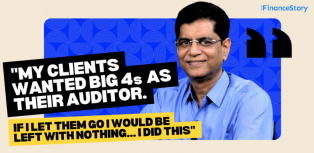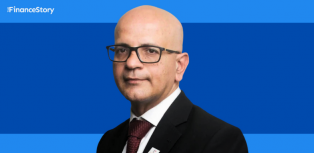- While the percentage of women on corporate boards and senior management levels is negligible, business and leadership coach Sangeeta Sumesh aims to turn that around.
- Apart from being a qualified Chartered Accountant (CA) and a Cost Accountant, she is the co-founder of ThinkUniQ Solutions and the bestselling author of (1) What the Finance, (2) Get High, and (3) Where’s The Moolah?
- For our Finance: 2022 and Beyond Series powered by Qapita – an ESOP Management Platform, we spoke to former CFO Sangeeta to gain insight into the evolving leadership roles, how women should be a part of corporate boards as well as how they can excel in the modern environment.
How did your career in finance begin? Could you give us a glimpse of your professional journey?
My father actually wanted me to become a doctor just like my grandfather.
I was open to the idea but eventually developed an aversion to physics. There was only one option left for me after that, and it was Commerce.
When I took up Commerce, I knew I had to pursue a professional degree, and there were two possible options before me: CA and MBA.
I wanted to pursue an MBA degree from a reputed institution and that meant moving away from my family.
As an only child, I did not want to stay away from my parents. So, I opted to be a CA, and my career in finance began.
Of course, when I started my professional journey, I never thought I would end up as a CFO.
In fact, I remember after I got married, I was telling my husband that once we have our first child, I would probably take a career break and probably return to work after the kids grow up.
However, the moment I experienced the taste of success, it just kept growing on me. I kept asking myself if I could manage without taking a career break.
Luckily, things worked out extremely well for me, and I was able to manage my family without compromising my career.
A few years down the line, I moved to leadership roles and eventually became the CFO at Dun & Bradstreet.
I always say people never know what they are capable of until they stretch their limits and achieve it.
Did you quit your CFO role to become a business and leadership coach? What was the motivation behind it?
Now coming to my coaching phase, I am sure it was pure serendipity.
While I was at Dun & Bradstreet, I used to have this recurring thought, wondering if I could contribute to the success of organizations, businesses, and leaders.
Fast forward, to 2017 to the launch of my first book A Glance at the Unknown, I discovered that there was a coach-training program in Chennai. I went for it and that became a turning point in my life.
However being analytical, I needed to evaluate the decision before I could take the plunge of becoming a full-time coach.
I wanted to be sure about my interests and myself. Most importantly, to see whether people would accept me as a coach.
That is why I did not just quit my job hastily. For the next four years, while serving as a full-time CFO, I coached on a part-time basis.
With over 25 years’ worth of experience in corporate finance, the role of a business coach seemed befitting. Then in 2020, I went in completely and became a full-time coach.
This activity has fulfilled my inner need and it feels like I am doing something purposeful in my life.
What are some of the key factors that CFOs need to keep in mind if they want to succeed in this ever-changing world? What does the next decade look like for the role of finance professionals?
Growing up back in the ’90s, normally as students, we would either be very good in sports, dramatics, or academics. Very few were good at multiple activities.
However, when you look at the younger generation, they seem to be good at sports, dance, and academics all at the same time. Nowadays, companies require multiple talents.
The same applies to all of us. With the fast-evolving business landscape and the financial sector, having diverse skill sets is crucial.
Finance professionals need to go beyond the traditional role and build a strategy. See if you can collaborate with the business, and figure out how the business can grow further, keeping finance as the base. I think that is very important.
You must keep yourself updated, not just with the finance domain, but also with areas that relate to your business, and see how much more you can contribute to it.
I have noticed that several CFOs think their role is just financial and that is the only area to look at. Conversely, they need to be all-round. That is when you sharpen your leadership skills.
After that, take up additional responsibilities so that you can contribute the most to the business.
Many people believe that finance professionals are boring and taciturn. I think this is true to some extent – they do not express themselves very well.
If you want to be successful as a CFO, you must have the ability to get things done and manage your people as well.
Once we start exhibiting a little more of the human aspect, it would make a lot of difference in the long run.
You have been an advocate for gender inclusivity in the C-suite and boards. Does the percentage of women on boards or in the C-suite look promising?
Have you ever heard the terms ‘male leaders’ or ‘men on corporate boards?’
Probably not. However, we keep hearing about ‘women leaders’ and ‘women on corporate boards’ a lot.
The fact is that in the corporate world, it has to be gender-neutral. Throughout my career, gender has never been an issue. They put more emphasis on whether I was capable of doing the job or not.
Of course, the fact remains that right now the percentage of women on boards is negligible. Why boards? Even at senior management levels, there are not that many women, and it just dwindles as we go higher.
Concurrently, we cannot deny the fact that many women do fall apart in the middle of their careers because of family responsibilities or other reasons.
What they do not recognize is that they have immense potential in them and it is okay to return to the corporate world after a sabbatical.
Women have these dreams, they have the capabilities and yet something is stopping them.
To solve that problem, I co-founded ThinkUniQ Solutions along with a former Chief Human Resource Officer (CHRO) of Walmart, AIG, and GE. We aim to help women grow in their space, whether in the corporate world or in their entrepreneurship journey.
To all women, I would like to say do not feel shy. There is no need to undermine yourself.
You have to work on yourself to live up to your potential. Be confident and go ask for what is rightfully yours.
Women think that the entire world rests only on their shoulders. Sometimes they do not like to express this aloud but when they need help, if they can go ahead and ask for it, that will give them extra leeway to grow further.
This will only be possible when women would learn to collaborate, whether it is with their family, friends, or colleagues. These people are always there to support you and can help you grow.
I must admit that the younger generation’s perspective is more progressive, they are not so reserved when it comes to their career. They do not look at things through traditional lenses anymore.
In fact, today as per statistics women hold almost 17% percent of the board seats.
Slowly but steadily, the narrative is changing.
In coaching, you meet several women and men. While coaching, what is the fundamental difference you notice between the genders?
Let me be clear that this is my observation and no one should generalize it.
For men, it is their communication skills. The fact is that some of them have difficulties expressing themselves in the workplace.
For the organization to run smoothly, it is vital to have a team that can communicate effectively. That is why their communication skills definitely need a lot more fine-tuning.
When it comes to women, I feel they get overwhelmed easily. They get upset over the smallest of things, thinking that it is a humongous task.
For that, I would suggest they take things one task at a time and have a work-life balance.
What are your thoughts on leadership and what are some of the qualities that modern leaders must possess?
The fundamental aspect a leader must have is adaptiveness.
As a leader, your role is to bring out the best in your team, but each of your team members is different in nature with unique skill sets.
For instance, in my previous role as a CFO, I had to manage the team in such a way that I could meet the deadlines.
One of my team members was prompt, I did not have to go and remind him every hour to complete his tasks.
Another team member was the polar opposite and needed constant reminders of the progress; otherwise, he would not be able to meet the deadline.
You cannot expect your team members to adapt to your working style anymore.
A leader is only as successful as the team members are. They are the contributing factor to your success.
For that reason, as a leader, you need to understand your team members, then adapt accordingly. That is the only way you can get the best out of them.














